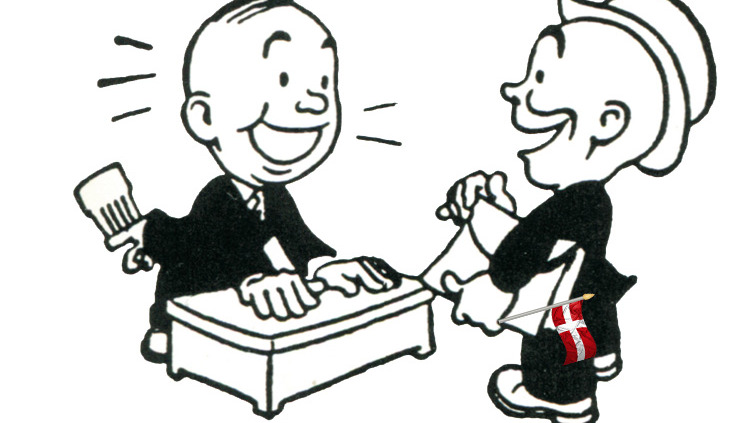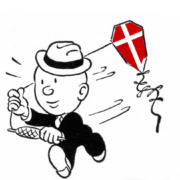How to Find a Job in Denmark Part 4: The Danish job interview
If you’ve been asked for a job interview at a Danish company, congratulations. Danish companies don’t like to waste time, so they wouldn’t be setting aside time to meet you if they didn’t think there was a solid chance they might hire you.
Job interviewing in Denmark is a difficult balance, because the Jantelov makes all forms of bragging or self-promotion distasteful to the Danes. You’ve got to convince the person interviewing you that you’re skilled and capable without sounding like a used car salesman.
What I tell potential hires to do is prepare by reviewing their working history and coming up with three good stories about projects they’ve worked on – two in which you did well and succeeded, and one that went very badly, but where you learned some important professional lessons.
By admitting to have made some mistakes in your work life or have been less than perfect on the job, you’ll give yourself a lot more credibility with Danish companies, where the default motto is “Work hard, but don’t take yourself too seriously.”
Come prepared with detailed stories
So your primary preparation should be thinking through your career and some of the challenges you’ve faced, particularly the ones that relate to this particular job. Think in terms of problem solving; what you did right, and also what you did wrong and how and why you’ll never do that particular thing again. Details are good, especially if they show your grasp of the nuts and bolts of your industry.
It’s also a good idea to re-examine the human qualities listed in the job ad – precision, people skills, efficiency or whatever – and arrive ready with real-life examples about you possess each of those qualities.
The Danish employer may ask you to take an online personality test before the interview. These popular tests can be your friend, because they’re designed to highlight personal characteristics that are important on the job.
In other words, they counteract the tendency for the hiring manager to just pick somebody she went to school with in Denmark and urge her to look more seriously at you, a strange foreigner who may actually be more qualified. (Some companies measure their best performers’ personalities and then look for people with similar characteristics.)
The tests usually take about 30 minutes to finish, and consist of multiple-choice questions about how you might act in various situations.
Try not to cheat on the personality test
It can be tempting to try to game these interviews – it doesn’t take a genius to figure out that if they’re a hiring a sales rep, they want a people person, or if they’re hiring an programmer, they want someone detail-oriented – but if you do cheat, you risk ending up with a job you hate, because the position was designed for someone with a different personality.
The personality test also helps the company tailor the questions you’ll get in your interview. I recently took one as part of a consultant job I’m working on, and the test results disclosed that I am very independent and like being in charge of my own workday. (Which is correct – and it’s why I’m a consultant.) But had I been applying for a full-time job at a company, the hiring manager might have asked me how well I handle things when I can’t make all the decisions.
If you chat with another applicant for the same job and find you’ve been asked different questions in the interview, the results of your personality tests may be the reason.
Lots and lots of handshakes
Danes love punctuality, so do everything you can to be on time for your interview. Danish industrial companies tend to be located on the outskirts of town, and if a bus goes there it often goes only every half hour, so for heaven’s sake plan out your route in advance. Better to be 20 minutes early and kill time in reception than be racing through the door 10 minutes late, sweating and swearing.
When you meet the hiring manager, shake his or her hand and make direct eye contact. Should she introduce you to more people, do the same for each of them – reach out your hand (even if you have to awkwardly reach across a table to do so), say your name clearly, and make eye contact. The Danes see eye contact as a mark of trustworthiness and confidence.
The hiring manager will probably offer some tea or coffee. In bigger companies, this will probably be delivered to the interview room on a tray, but in smaller companies you may be taken to the group kitchen and told to pour your own hot beverage out of a machine, just like the existing employees do.
You can expect some small talk while all this is going on, so if you’re not the naturally chatty type it can be useful to come pre-equipped with some comments about the weather, the difference between Danish weather and your home country’s weather, or similarly non-controversial topics.
Once you sit down, your Danish job interviewer may try to warm up the conversation with few questions about your family or personal life, mostly to get a sense of you as an individual or gauge how committed you are to staying in Denmark. You can stick to brief generalities here; there’s no need to disclose any information that makes you uncomfortable.
Avoid the beggar’s mentality when looking for a job in Denmark
And then comes the main part of the interview, where you will be asked about how your qualifications match the job on offer. While you shouldn’t be arrogant, you shouldn’t have a beggar’s mentality, either. These people are taking time out of their busy day because they can’t run their business without someone like you.
Approach the interview like a business deal: do both parties have something to offer each other? One researcher found that foreign applicants were often rejected for a job because they seemed too submissive in the interview process; the Danish hiring manager didn’t think they’d be able to stand up for themselves in the hurly-burly of Danish work teams.
One good place to stand up for yourself is questions about your family planning. If you’re a woman aged 25-45, there’s a solid chance the interviewer may also ask whether you intend to have children (or more children) soon. Danish parental leave benefits are generous, and women still take more time off after giving birth than men do, so the employer understandably wants to know if they’re hiring someone who will be taking substantial leave in the near future.
Roundabout answers to baby questions
But the question is illegal. That means it will probably be asked in a roundabout way. “So you’re newly married? Is it just the two of you? Denmark is a great place to raise children, you know.” Feel free to answer in an equally roundabout way. “Oh, my husband and I want to focus on our careers right now. And we really want to do more traveling.”
It’s none of their business if you plan to have two sets of triplets in the next two years. Besides, if the company wants to have customers in the future, someone is going to have to give birth to children now.
The company may also ask you to bring a copy of your straffeattest, which is a document you get from the Danish police showing that you have never been convicted of a crime in Denmark. This is particularly likely if the job will involve dealing with money, confidential information, or children.
Don’t take this request personally; every candidate for the job will have to do this, including Danes. You can order your straffeattest online from the citizen service borger.dk.
What should you wear to the interview?
The Danes are not formal people, so you will really only need a business suit for the interview if you’re hoping to work at a bank. Foreigners looking for jobs in Denmark tend to be overly formal in both dress and manner, which feeds into the Danish prejudice that non-Danish workers are stiff, robot-like and not individual thinkers.
You’ll probably be fine in a well-made sweater, a wrinkle-free shirt and trousers, plus some dark shoes of a type you might wear on the job. If you have time and can afford to, buy your interview clothes in Denmark – it will help create that sense of ‘social fit’ that Danish companies are so keen on.
Another alternative is to look up articles about the company’s CEO online and see what he or she wears in a business context, and then come dressed like that.
And skip the cologne, particularly for men. In many cultures, fragrance is appropriate in all settings, but in Denmark cologne suggests you have a romantic encounter planned.
Should you follow up after the interview?
There’s a lot of disagreement about the extent to which you should follow up after a job interview.
Personally, I think a brief email the next day is a nice touch. Saying tak for sidst and adding a couple short bullet points about why you’re right for the job is a way of showing a sincere interest; this is also a good time to supply any additional information the interviewer asked for during your meeting.
Then – leave it alone. If they’re interested, you will hear from them within a couple of weeks, certainly less than a month. And if they do get in touch, you may just be at the beginning of a long hiring process that could include more interviews, more tests, and weird inexplicable delays.
This is standard practice: the hiring process when I joined Danske Bank took more than 3 months, which I later learned was because HR thought I was a poor fit for the job, despite the hiring manager’s insistence. The hiring manger won, and I enjoyed working at Danske Bank for many years.
If you do get an offer for a job in Denmark, good for you! Your company will probably send you a contract to sign. Keep in mind that if you’re a member of a union, you can have the union’s legal team review the contract to make sure it’s fair to you. Your employer won’t be surprised or offended by this – it’s standard practice – and it’s a particularly good idea if you’re handed a contract that’s all in Danish.
[icon name=”facebook-square” class=”fa-3x”] [icon name=”twitter-square” class=”fa-3x”][icon name=”instagram” class=”fa-3x”]
Buy Kay’s books about Denmark on Amazon, Saxo, Google Books, Apple Books, Barnes & Noble Nook, or via our webshop.
Image mashup copyright Kay Xander Mellish [current_year]
Read more:
Decoding your Danish pay slip and understanding your Danish taxes
How to handle a Danish business meeting
What to wear to work in Denmark: Quiet colors, quality cut and fabric
Your first day at work in Denmark: Handshakes, passwords, and several people named Mette
Trailing spouses and working in Denmark
Motivating Danish employers: Tips for foreign managers
Networking in Denmark: 5 useful tips for making Danish business contacts
Secrets of socializing with your Danish colleagues
The Danish art of taking time off
Your free daily banana and five weeks off: Job benefits in Denmark
Why job titles aren’t that important in Denmark
Job search in Denmark: Your Danish cover letter plus LinkedIn plus two magic words
Job hunting in Denmark: Putting together your Danish CV
Fine-tuning your approach to the Danish job market
Finding a job in Denmark: Some tips from my experience
Is joining a union a waste of money? And what is the difference between a union and an A-kasse?
Will I ever be promoted? Plus, how to leverage your annual review
Taking sick days in Denmark, plus how to deal with stress








This post doesn’t show up in the spot where I expected to see it at https://www.howtoliveindenmark.com/category/podcasts/
It lists parts 1, 2, 3, .. then 5 !
BTW Nice work you’re doing, I just discovered you and your creations whilst applying for a contract IT job at a local CPH based bank, as I was doing my background research/searches about Denmark. Thanks for the high quality touch in your blog, I’m nearly done with binge listening to all the podcasts.. and will consume your material from now onwards on a regular basis.
All the best,
Mike
Thanks for letting me know, Mike! I’ll check it out. Glad you enjoyed the podcasts- should be a new one coming next week. 🙂
All of these articles are so so super helpful. My (Danish) wife and I are planning on moving to Denmark ASAP and all of your posts have helped me to tailor my job search to “be more Danish”. Hopefully it’ll pay off!
Great Article. It helped me a lot to organize myself before an interview. Thanks for you time.
Hi there, thank you for sharing those informations and experiences. Nowadays I’m in a recruitment process with a Danish company and I got the good news from hiring manager a week ago that I have passed the elemination and will receive a proposal. Yet, after a week, even the hiring manager told me that I will get a proposal a day after, I could not receive anything from neither hiring manager nor HR department. Is this a normal procedure in Denmark ? I tought they are on time and follow the schedule. I’ve sent a mail including my concerns and situation, however I could not reveice a proper answer for it too. Thanks and regards.